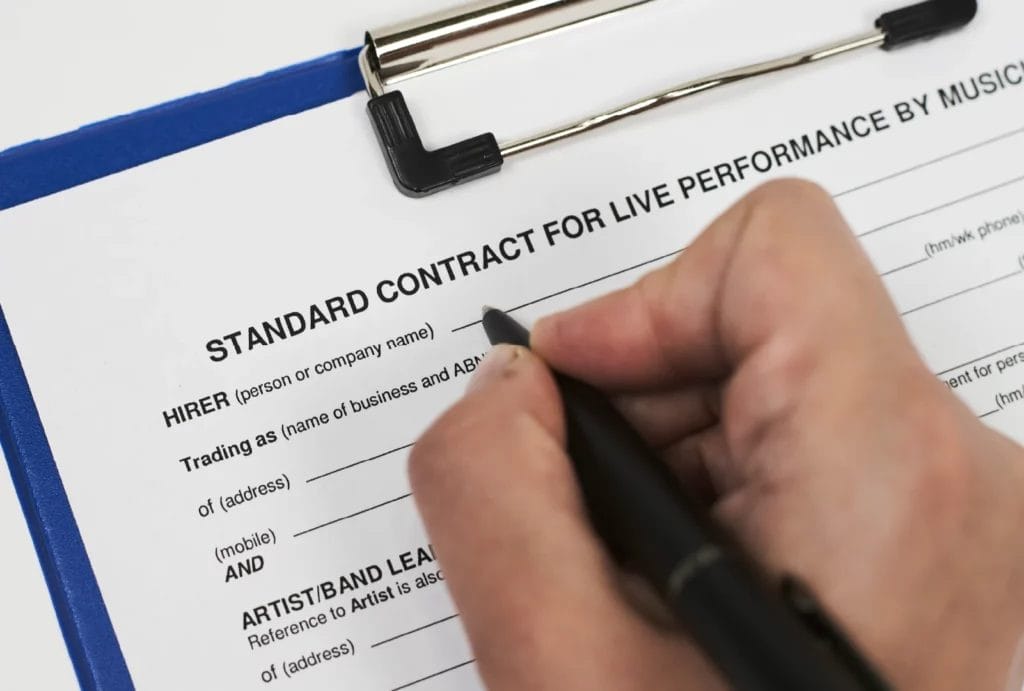For those about to rock, we salute you.
But first, don’t forget to review and sign your live performance contract.
These documents outline the rights and responsibilities of the performers, venues, and organizers, protecting you and your partners from unnecessary risks. They are legally binding contracts that hold all parties accountable if they fail to deliver on their promises.
Before you take the stage, make sure you can rock responsibly with our free band contract checklist!
Download Your Free Live Performance Contract Checklist!
Why a Band Contract for Live Performance Matters
In short: live band contracts are necessary because they make sure you (the band) get paid and know what to expect from your gigs. For venues, contracts make sure the talent they booked performs as promised.
Live band contracts include specific agreement details like payment terms, schedules, security information, and more.
If either party — the band or the venue — doesn’t live up to the expectations in the contract, the wronged party has legal recourse. If someone fails to do what they agreed to, there are legal actions the other person can take (like filing a lawsuit).
Without a legal agreement or contract it becomes much harder to resolve any kind of dispute between the band and the venue.
For example, say you perform a gig at a popular dive bar, but at the end of the night the bar manager shorts you $100. Without the compensation amount in writing, there’s no way for you to prove they didn’t pay you correctly.

Checklist: Essential Elements to Include in a Live Band Performance Contract
Live performance contracts can be tailored or expanded on as needed, but the most common elements include:
Name and contact information of both/all parties:
Typically, name refers to your full legal name, not your stage name.
Description of services:
This includes things like the venue name and info, performance date and performance times.
Performance of services:
The section for all other details about the performance like set-up time, sound check time, how long your set is, if repeat songs are allowed, language stipulations (like swearing), and any other important details about your set.
Payment:
How much you’ll be paid, how you’ll be paid (check, cash, etc.), and when you’ll be paid. This section should also include information about any required deposits.
Cancellation policy:
Cancellation policies are designed to protect both the band and the venue from financial losses if one or the other cancels at the last minute. Typically, this includes the minimum amount of notice in case of a cancellation, and what will be paid to each party if an event is cancelled on short notice.
Relationship of parties:
A short section describing the relationship between the venue/event and the band. This is mainly used to establish that band members are not employees of the venue.
“Force Majeure:”
Also known as “acts of God” or “acts of nature.” This section outlines situations that would release both parties from the agreement without penalty. These are usually events like earthquakes, tornadoes, and other unforeseen circumstances.
Governing law:
Designates which state’s laws will apply to the contract and any legal disputes that occur, and which state lawsuits must be filed.
Signing instructions:
The signature section typically includes spaces for both the band representative and the venue rep to sign and print their names, as well as the date the contract takes effect.
Additional sections you might want to add to your contract, depending on the specific event include:
Conflict resolution:
Directions for how disputes will be handled, such as through mediation or arbitration.
Terms:
Usually for repeat performances, the terms section includes details about frequency of performances, how to extend a contract, or renew it.
Promotion:
Who is responsible for promoting the event, and how they promote it.
Merchandise:
Can you sell merch? What kind, where, and does the venue get a cut of those sales?
Recordings:
Are visual or sound recordings allowed, who can use those recordings, and for what purposes?
Parking
Where should band members park their cars during their performance, and where should they park to unload and pack up all their gear?
Pro Tip: If you’re signing paper copies of the contract instead of digital ones, sign two copies so each party has one with original signatures.

Limitations: What a Live Band Performance Contract May Not Cover
Most contracts can’t cover every possible thing that could occur during or around your performance. If they did, they would need to be 50+ pages long! Standard performance agreements are typically closer to one or two pages and may not cover:
- Promotion rules
- Recording stipulations
- Stage specifics (like height, depth, etc.)
- Procedures for handling damage or loss of your equipment
- Details about legal issues like slander allegations or liability for injuries experienced by audience members
With the help of your lawyer, you might be able to add some of these considerations to your band performance contract if they’re not already included.
Liability Insurance 🤝 Live Band Performace Contract
Most live band contracts won’t include clauses about the equipment and gear that belongs to you and your bandmates. They likely won’t include details about liability issues, either.
For example, if a speaker falls over and hits someone during your set or an audience member trips on your extension cord, the venue might say it’s your fault, not theirs. That means you and your band could end up dealing with the consequences, like paying for the injured person’s medical bills.
This is why you need band liability insurance. Band insurance is designed to protect you from the costs of claims and lawsuits related to your performances.
- List out the details of your agreement with a venue
- Establish expectations around your pay and performance
- Ensure you get paid correctly
- Provide options for settling disputes between you and the venue
- Apply only to the specific venue and/or event
- Acts as a financial safety net for your business
- Helps you pay claims due to accidental injuries or property damage involving the audience or merch
- Helps pay for claims or lawsuits related to accusations of libel, slander, and copyright infringement
- Provides coverage for accidental damage to a venue’s stage or other property
- Provides coverage for accidental damage to rented spaces like rehearsal rooms or recording studios
- Travels with you wherever you perform (annual policies only)
- Optional policy add-ons provide coverage for things like your gear and equipment or cyber security breaches (annual policies only)
Frequently Asked Questions About Live Band Performance Contracts
What Is the Purpose of a Live Performance Contract?
The live performance contract legally defines the relationship between the performers and the client (venue, event, organizer) hiring them. It describes, in writing, what services the performer provides, how the performance will be conducted, and the agreed-upon payment terms.
What Is an Example of a Live Band Performance Contract Template?
Some online legal businesses like Rocket Lawyer and Law Depot offer performance contract templates. If you use a free template, have your lawyer review the contract before signing.
Should a Lawyer Review My Live Performance Contract?
Yes. If you’re using a free template, you should have a lawyer review your contract before presenting it to anyone to ensure it’s not opening you up to additional risks or missing crucial language.
If a venue or event presents you with a contract, it’s also a good idea to review that contract with your lawyer to ensure it’s fair to you.






